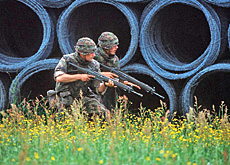
New army structure comes under fire

Government plans for further change to Switzerland's militia army have triggered a controversy ahead of a parliamentary debate on the role of the armed forces.
Opponents, mainly from the rightwing Swiss People’s Party, have criticised the reorganisation as hasty, unreasonable and even unconstitutional.
The defence ministry has also come under fire from the three other main political parties, including the centre-left Social Democrats.
The debate in the House of Representatives during the final week of parliament’s autumn session comes three years after voters agreed to a major reform of the armed forces.
But according to the People’s Party, the latest proposals are tantamount to a further weakening of the army and could force the country to join an international military alliance.
The party wants the government to live up to promises made during an earlier reform to boost the number of army instructors and to reconsider the idea of a smaller core of combat troops.
“The proposal is a typical brainchild of bureaucrats and a lack of instructors leads to a serious loss of expertise,” said parliamentarian Ulrich Schlüer.
He added the party is only willing to accept discussions on further reform if several preconditions are fulfilled.
“A militia army like ours can’t cope with too many reorganisations in a short period of time if it is to remain credible and operational to counter possible terrorist attacks,” Schlüer told swissinfo.
From border to infrastructure
The government says its aim is to shift the priorities from traditional defence strategy, using tank and artillery units, to the protection of key infrastructure. This includes transit routes, buildings and international conferences, with soldiers notably assisting police and other civilian authorities.
The proposal foresees halving the number of combat troops defending Swiss territory from 2008 onwards.
“Switzerland’s armed forces still constitute one of the largest armies in Europe with a total of 120,000 members,” Defence Minister Samuel Schmid told the Neue Zürcher Zeitung.
“We have to proceed in a pragmatic way, it’s part of our tradition. We have already come a long way towards closer cooperation with the cantons in view of the European football championships in 2008.”
The defence ministry also argues that the planned reorganisation is the result of spending cuts approved by parliament over the past few years.
Fundamentals
Social Democratic parliamentarian Barbara Haering, who is also the party’s defence expert, has reservations about the use of troops for police duties.
“Police forces are better suited and trained for such tasks and the deployment of troops to maintain law and order is historically fraught ever since soldiers fired at against anti-fascist demonstrators in Geneva in the 1930s,” she said.
Haering reckons that none of the four main political parties is really happy with a police mandate for the troops. But she believes there’s a good chance that the government proposal will eventually pass.
“Under the planned concept about 70,000 soldiers have no assigned mandate, to put it bluntly,” she told swissinfo.
However she is convinced that the controversy will continue and fundamental issues will have to be tackled, including the conscript system.
swissinfo, Urs Geiser in Flims

More
Militia army
The latest army reform came into force at the beginning of 2004 following a nationwide vote.
The army is now expected to focus on protecting key infrastructure and assisting civilian authorities.
Switzerland’s armed forces have about 120,000 active members with an additional 100,000 reservists making it one of the largest armies in Europe.
The principle of a militia army with a conscript system for male citizens has been maintained so far.
About 36% of voters came out in favour of abolishing the army during a nationwide ballot forced by a pacifist group in 1989.
The reorganisation foresees:
18,500 combat troops
33,000 infantry troops specialising in protection and assisting police
68,000 troops trained for general duties
500 members for international peacekeeping missions
Neutral Switzerland is not a member of Nato, but it joined Nato’s Partnership for Peace programme ten years ago.
There are currently about 220 Swiss peacekeepers in Kosovo serving under Austrian command in the Nato-led force.
In total there are about 250 peacekeepers and military personal in international missions abroad.

In compliance with the JTI standards
More: SWI swissinfo.ch certified by the Journalism Trust Initiative





























You can find an overview of ongoing debates with our journalists here . Please join us!
If you want to start a conversation about a topic raised in this article or want to report factual errors, email us at english@swissinfo.ch.